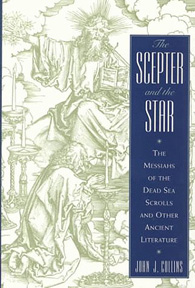Multimedia • Reference • Religion • Travel |
 The Scepter and the Star : The Messiahs of the Dead Sea Scrolls and other Ancient Literature John J Collins
Description From The Publisher: Two thousand years ago in Palestine people looked for a messiah to lead them to a better life. Jews and Christians are still diligently seeking a messiah today. In the very recent past Rabbi Menachem M. Schneerson, an Orthodox Jewish leader related to the Hasidic movement, prophesied in the New York Times that "the Moshiach is on his way." At the same time, in Waco, Texas, the Branch Davidians acknowledged David Koresh as the messiah, and they were willing to die for him. In The Scepter and the Star, John J. Collins turns to the Dead Sea Scrolls to shed new light on the origins, meaning, and relevance of messianic expectations. The first Christians were Jews who believed that Jesus of Nazareth was the messiah — the Christ; Christians could be called "followers of the messiah." Other Jews did not accept this claim, and so the Christians went their own way and grew into a separate religion. The disagreement about the identity of the messiah is the root difference between Judaism and Christianity. The recent disclosure of the full corpus of the Dead Sea Scrolls now makes it possible to see this disagreement in a fuller context than ever before. The most stunning revelation of the new evidence is the diversity of messianic expectations in Judaism around the beginning of the common era. The Hebrew word "messiah" means "anointed one." According to the scrolls, the messiah could be a warrior king in the line of David, a priest, a prophet, or a teacher. He could be called "the Son of God." Jesus of Nazareth fitted the expectations some Jews of the time had of the messiah. The majority of Jews, however, had quite different expectations. Reader's Index Send us your favorite quotes or passages from this book. About the Author John J. Collins is the Holmes Professor of Old Testament at Yale University Divinity School. Table of Contents
Customer Reviews Write your own online review. Look for Similar Books by Subject | ||||||||
Copyright ©1996-2005 CenturyOne Bookstore. All Rights Reserved. All prices subject to change and given in U.S. dollars. Your purchase from CenturyOne.com will assist the CenturyOne Foundation in providing funding for various archaeological and research projects which seek to provide more information about the period of the First Century C.E., the origins of Christianity and the world of the Bible in general. All materials contained in http://www.centuryone.com are protected by copyright and trademark laws and may not be used for any purpose whatsoever other than private, non-commercial viewing purposes. Derivative works and other unauthorized copying or use of stills, video footage, text or graphics is expressly prohibited. |
